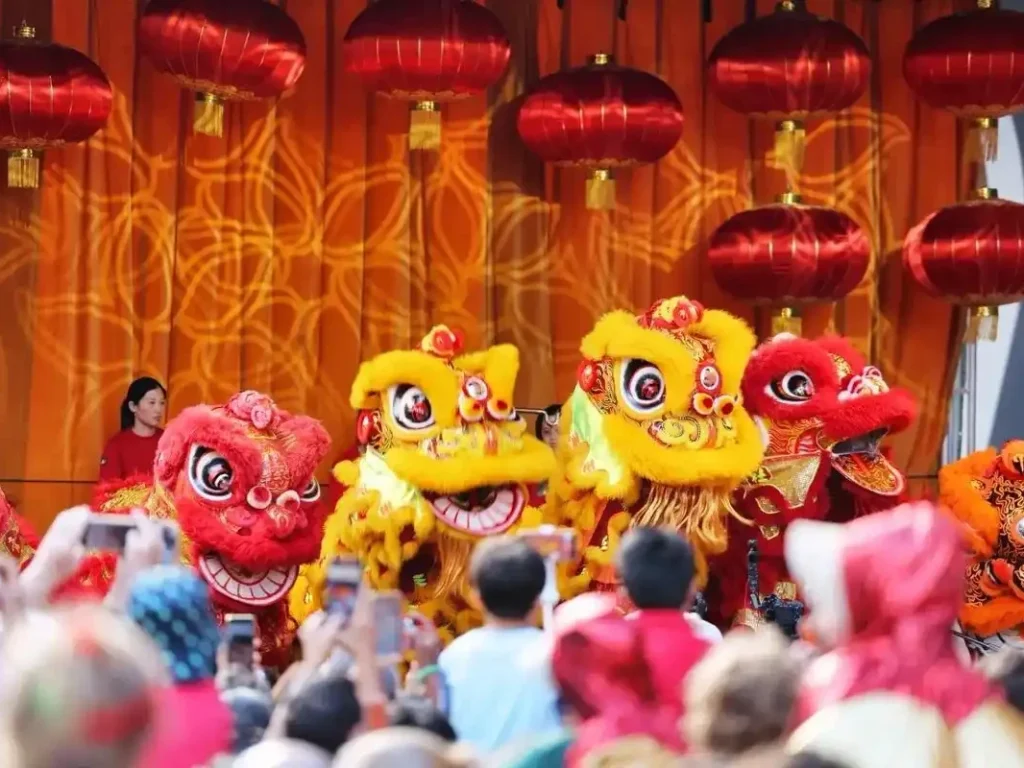🎧 Listen to text audio:
看!这 是 大熊猫!
Pinyin
Kàn! Zhè shì dàxióngmāo!
English
Look! This is a giant panda!
它 胖 胖 的,像 一 个 大 毛球。
Pinyin
Tā pàngpàng de, xiàng yí gè dà máoqiú.
English
It is chubby, like a big fluffy ball.
大熊猫 住 在 中国 的 森林 里。
Pinyin
Dàxióngmāo zhù zài Zhōngguó de sēnlín lǐ.
English
Giant pandas live in the forests of China.

它 最 喜欢 吃 竹子。它吃竹子 的时候,“咔嚓 咔嚓”,听 起来 非常 香!
Pinyin
Tā zuì xǐhuan chī zhúzi. Tā chī zhúzi de shíhou, “kāchā kāchā”, tīng qǐlái fēicháng xiāng!
English
They love eating bamboo the most. When they eat bamboo, “crunch crunch,” it sounds so delicious!
大熊猫 很 懒,每天 做 三 件 事:
Pinyin
Dàxióngmāo hěn lǎn, měitiān zuò sān jiàn shì:
English
Giant pandas are very lazy. Every day, they do three things:
第一,吃 竹子;
Pinyin
Dì yī, chī zhúzi;
English
First, eat bamboo;
第二,睡觉;
Pinyin
Dì èr, shuìjiào;
English
Second, sleep;
第三,慢慢地 爬 树。
Pinyin
Dì sān, mànmande pá shù.
English
Third, slowly climb trees.
大熊猫是中国的 宝贝,世界 上 很多 人 都 喜欢 它!
Pinyin
Dàxióngmāo shì Zhōngguó de bǎobèi, shìjiè shàng hěn duō rén dōu xǐhuan tā!
English
Giant pandas are treasures of China. Many people in the world love them!
你 也 想 抱 抱大熊猫 吗?
Pinyin
Nǐ yě xiǎng bàobào dàxióngmāo ma?
English
Do you also want to hug a giant panda?
语法点 (Grammar Points)
1. 像 + Noun – To be like
This structure is used to compare one thing to another.
文中 (In text):
– 它胖胖的,像一个大毛球。- It is chubby, like a big fluffy ball.
例 (Example):
– 她的 头发 像 云 一样 柔软。- Her hair is as soft as clouds.
2. 最 + Verb / Adjective – Superlative Marker (“Most”)
最 means “most” and is used to express the highest degree of a verb or adjective, indicating a favourite, strongest preference, or superlative quality.
文中 (In text):
– 它最喜欢吃竹子。 – It likes eating bamboo the most.
例 (Example):
– 我最喜欢中文课。– I like Chinese class the most.
– 她最爱看书。– She loves reading the most.
– 这个饭店最好。 – This restaurant is the best.
3. 听起来 + Adj – Sounds like
This structure describes how something sounds.
文中 (In text):
– “咔嚓咔嚓”,听起来非常香!- “Crunch crunch,” it sounds so delicious!
例 (Example):
– 这 首 歌 听起来 很 开心。- This song sounds very happy.
4. 每天 + Verb – Every day…
This structure expresses daily habits.
文中 (In text):
– 大熊猫很懒,每天做三件事。- Giant pandas are very lazy. Every day, they do three things.
例 (Example):
– 我 每天 早上 喝 一 杯 牛奶。- I drink a glass of milk every morning.
5. 第 + Number – Ordinal Numbers
Used to indicate order: first, second, third, etc.
In lists or sequences, it’s often followed by a verb or activity.
文中 (In text):
– 第一,吃竹子;第二,睡觉;第三,慢慢地爬树。
– First, eat bamboo; second, sleep; third, slowly climb trees.
例 (Example):
– 他是第一个来的人。– He is the first person to arrive.
– 我住在第三楼。– I live on the third floor.
– 第二课很有意思。– The second lesson is very interesting.
Download the PDF Version
Want to read this story offline? Get the PDF version sent directly to your email.
Simply enter your email below, and we’ll send you the downloadable PDF for this lesson.


